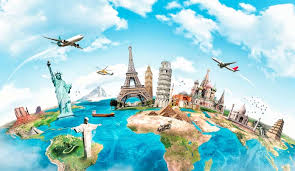About the varieties, motives and benefits of travel
 According to the Dictionary of the Russian Language of Sergei Ivanovich Ozhegov, travel is a trip or walking on foot to distant countries, places.
According to the Dictionary of the Russian Language of Sergei Ivanovich Ozhegov, travel is a trip or walking on foot to distant countries, places.
Everything seems to be clear, but immediately the question arises of what can be considered “distant countries and localities”. The concept of “distant” is always relative. For one person, distant terrain begins one kilometer from home, for another five hundred. For a child, it can start in a neighboring yard.
It turns out that just “range” is not enough to determine the journey. The problem disappears by itself if the concept of “distant terrain” is supplemented with such characteristics as uncharted, unstudied. Going to new places unknown to him, a person creates a travel situation.
Novelty and unknown well reflect the essence of the journey and allow a better understanding of its dynamics. So, the first trip of Kiev to Simferopol, fully meets the criterion of novelty and may well be called a journey. At the same time, regular movement along the Kiev-Simferopol route (for official or personal need) removes the effect of novelty and unknown, and the journey turns into a regular ordinary trip. It turns out that the same person on the same route in one case is a traveler, in the other, it seems to be not very.
The man for the twentieth time, flying along the well-known, familiar route Kiev-New York, is less a traveler than the one who leaves for the first time from Kiev to Zhytomyr.
What is a trip It seems that a trip cannot be reduced solely to an event. In its manifestations, it rather resembles a continuous process in which a high level of novelty-unknownness must constantly be present.
Another argument in favor of defining travel as a process is the phenomenon of its transformation. For example, the native Kharkov citizen first goes to Lviv and settles there for a while or even remains to live. Relocation and settlement are consistent with the concept of travel, as there are unknown paths and the novelty of the situation. However, after some time, a person settles in a new place and from a traveler turns into a resident of the area. The appearance of the element of settledness formally terminates the process of travel.
From what moment the journey stops, it is hardly possible to determine. In any, even a well-known place, novelty is always present, due to the constant variability of the world. The environment is changing, and the person himself is changing. In addition, the very phenomenon of novelty is very subjective. After all, even old well-known things can at some moments be seen in a new way. Such “discoveries” are constantly present in our lives.
Any movement in space, to a greater or lesser extent, but necessarily includes an element of travel. In other words, there is no movement without “travel”. In addition, the journey always takes place not only in space, but also in time. This indissoluble dialectic unity allows a better understanding of the diversity of the phenomenon of travel.
If we recall the possibility of virtual travel, for example, using imagination, fantasy, the concept of travel is completely blurred. Wherever you go, think about anything – you immediately begin to travel. In order to avoid confusion, I’ll immediately say that in these notes, travel means only real movement in real space of very specific people.
The notes do not consider travels of people with severe psychotic disorders, for example, in twilight states of consciousness (ambulatory automatism) or committed under the influence of overvalued and delusional ideas.
Also, I do not touch on the topic of forced travel, against the will of a person (for example, moving along the stage of convicts to places of deprivation of liberty, transportation of people abducted for forced labor, etc.).
Further in the text, by travel I will mean only voluntary movement on foot or by means of vehicles in new and little-known areas for a given person (s).




